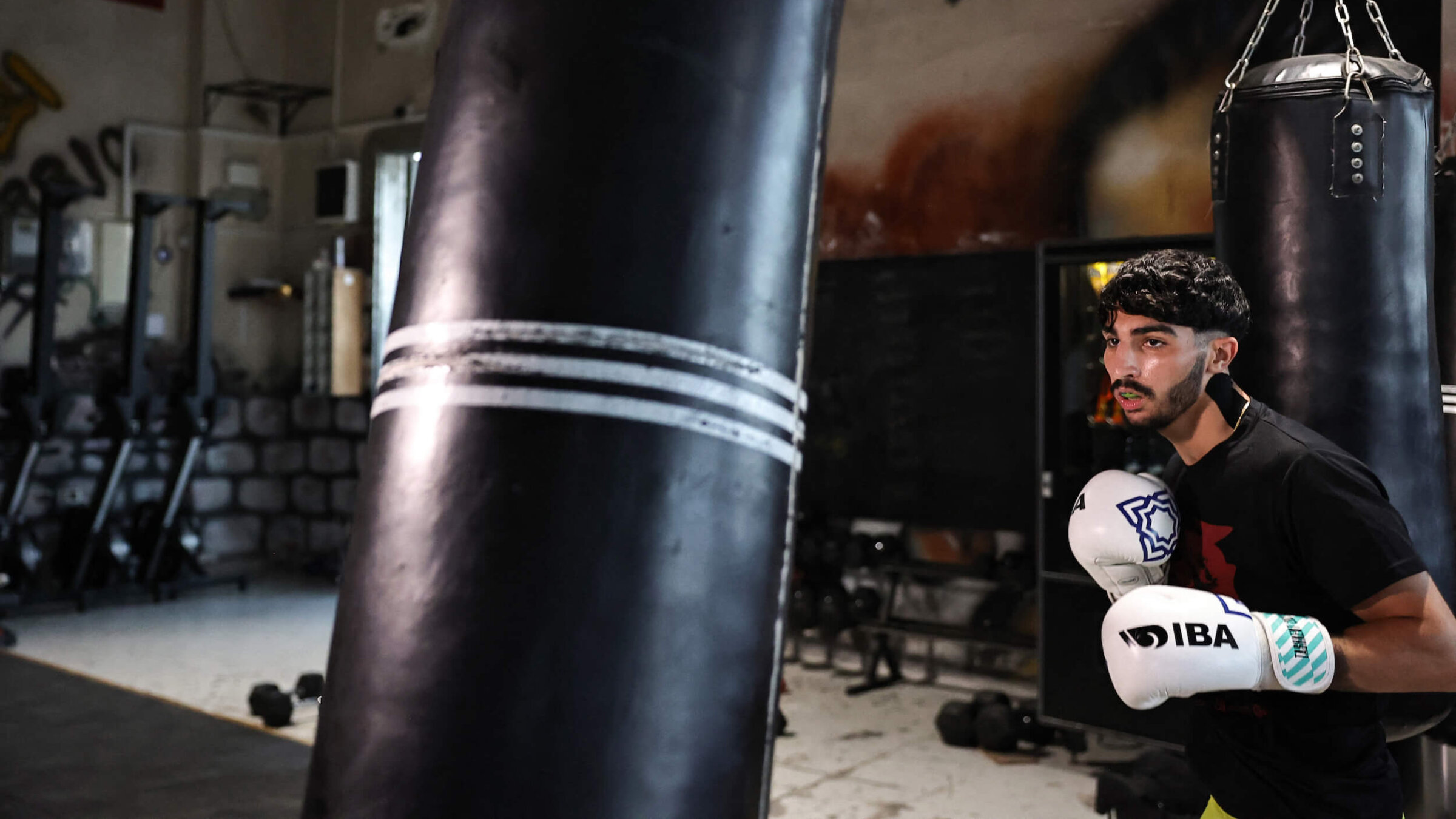Palestinians will compete at the Olympics — without a state to represent. Here’s why Jews should be outraged
This Olympics should remind Jews everywhere that Palestinians still lack a state. Our history and our faith obliges us to act in support of them

Palestinian lightweight boxer Waseem Abu Sal training at a gym in Ramallah in the occupied West Bank, as part of his preparations after qualifying for the 2024 Paris Olympic games. Photo by Zain Jaafar / AFP / Getty Images
This summer in Paris, Israeli athletes will proudly compete as citizens of Israel. Six Palestinians will be competing too — but not as citizens of Palestine, because there is no nation of Palestine.
This year has seen the question of Palestinian statehood gain extraordinary attention, with 143 member states voting to admit Palestine to the United Nations General Assembly. Given our own people’s history of statelessness, it is time Israelis and Jews globally grapple with the inequalities of Palestinian statelessness visible at this Olympics, and act now to ensure an autonomous Palestine.
The International Olympic Committee has recognized Palestine under its own country code since 1996. But under international law, their legal status is “fragmented,” according to Omar Shakir, Israel and Palestine Director at Human Rights Watch.
“Palestinians, wherever they live, are repressed on account of who they are,” Shakir said. “There’s not one square inch of land between the Jordan River and the Mediterranean Sea where Palestinians are on the same level as Israelis.”
Fragmentation for many Palestinians is de facto statelessness, Shakir said. This complicates everything about daily Palestinian life — including sports. Coordinating something simple, like a soccer matches between teams in the West Bank and Gaza, becomes impossible. “This leads to fraying social ties, political ties, football teams, art exhibits, cuisines,” Shakir said.
Creating an Olympic team requires shared, accessible venues; ample opportunities to practice; adequate food and medical support; and freedom of movement to compete. Statelessness threatens all of these for Palestinian athletes, Shakir said.
Jews have both biblical narratives and historical records of statelessness in our history. These painful stories should lead us to sympathize with and advocate for the Palestinians who have been caught in such a limbo for far too long.
Like nearly all Ashkenazi Jews, from pre-Napoleonic Europe through to the post-Soviet Union era, I have statelessness in my family history. In 1935, the Nüremberg Laws rendered my grandparents stateless. Stripped of their citizenship and their dignity, Jews were cut out of the national fabric of Nazi Germany.
And yet, they continued to live there. So my grandparents became a stateless people — a question, a problem. My grandfather escaped to the United States in 1937. My grandmother survived Auschwitz.
It was no coincidence that in 1936, Adolf Hitler also all but banned Jews from participating in the Berlin Summer Olympics. This is because the chance to participate in the Olympics has always been symbolically attached to citizenship. Countries compete; people who are not seen as true or equal citizens of those countries do not have the same right.
For as long as the modern Olympics have existed, national identity — and the lack thereof — have been interwoven into the competition.
The nonstate category of independent Olympians was first created as a workaround to a Western-led boycott of the 1980 Moscow Olympics in protest of the Soviet invasion of Afghanistan.
Iterations of the “independent Olympian” category have been used in recent years to punish nations for both international crimes and sporting misconduct. Rather than penalizing the individual athletes from Russia for their nation’s invasion of Ukraine, or for its international doping scandal,the IOC’s independent Olympian status has allowed Russian athletes to compete without competing for Russia.
In 2016, refugees of Ethiopia, the Democratic Republic of Congo, South Sudan, and Syria competed as refugee Olympians, a category that extends into this year’s games.
American Jews should feel particularly empathetic toward Palestinian athletes at the games — because our own country is largely responsible for their plight. American athletes may compete against Palestinian athletes, suggesting before the entire world that Palestinians are just as much a people as Americans are. Yet American refusal to recognize a state of Palestine — including through crucial vetoes at the UN Security Council — has ensured that Palestinians remain a people in suspension, like my grandparents once were — a question, a problem.
The Torah commands us to aid the disempowered stranger, “for we were once strangers in the land of Egypt.” And yet, Israeli Prime Minister Benjamin Netanyahu has freely admitted that he has prevented the creation of Palestine over his decades in power, and is proud of it. Recent polling shows that the majority of Israelis now oppose recognizing a state of Palestine.
Given our people’s historical memory of statelessness, I am heartbroken that intergenerational trauma, a bunker mentality, and racism have now made so many of us blind to the humanizing dignity of statehood for all people.
It is time for American Jews to object, and incentivize the creation of Palestine through peace-driven initiatives like the Not on our Dime Act, as well as the Boycott, Divestment and Sanctions movement.
Fundamentally, Israeli and American Jews alike must imagine a world where they can proudly root for Palestinian Olympians alongside their own representatives. Israelis must recognize and reject leaders who benefit from perpetual warfare, as Americans once did. Only peace can lead to peace, and only Palestinian statehood can end the violence of the 57-year occupation.
Indeed, it is the absence of Palestinian statehood that lies at the root of Israel’s problems. Until Olympians can wear medals for a free and independent Palestine around their neck, Israel will never be freed of the albatross around its own.















